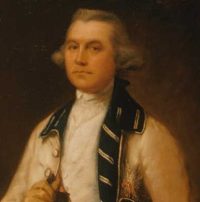Fourth. About three hours before day one thousand of the Indians attacked the cantonment of the seamen. They were encouraged to this attempt by the incessant rains in which they flattered themselves our fire-arms would be useless. Their approach was favoured by a great number of thick bushes that grew upon the side of a rivulet, which they passed in the night, and by keeping close, eluded the vigilance of the patroles. Upon the alarm, Col. Monson and Capt. Fletcher, with the piquets, were dispatched to the assistance of the seamen, who very sensibly kept firm in their posts, and were contented to repulse them till day-break; when a fresh piquet of the 79th regiment appearing upon the Indians right flank, they fled, were pursued, and dispersed, with the loss of three hundred men. Had their skill or weapons been equal to their strength and ferocity, it might have cost us dear. Although armed chiefly with bows, arrows, and lances, they advanced up to the very muzzles of our pieces, repeated their assaults, and died like wild beasts, gnawing the bayonets. This attack cost us some few men ; but we lost a most excellent sea officer, Capt. Porter, lieutenant of the Norfolk, sincerely and justly lamented by all. We had scarce finished this affair, when another body of them, with part of the Spanish garrison, again attacked the church N”* 2. forced the Seapoys from their post in it, nearest the town, and took possession of the top, from whence they killed and wounded several of our people, who were entirely exposed to all their weapons. Notwithstanding this disadvantageous situation, the European soldiers maintained their post behind the church with great firmness and patience, and at last dislodged the enemy, with the assistance of some field-pieces, and the good conduct of Maj. Fell, field-officer of the day, Capt. Fletcher, and other brave officers sent to their relief. The Spaniards left seventy dead behind them, in and about the church. On our side, Capt. Strahan, of the 79th regiment, a very good officer, was mortally wounded, and forty private men wounded or killed. This was the enemy’s last effort: all their Indians, excepting one thousand eight hundred, discouraged by their losses, returned home. Our working parties and the fire of our batteries, which had been a little interrupted by these attacks, recommenced with greater spirit than ever. We found likewise the good effects of giving the enemy no time to repair their embrasures or carriages in the night. They opened only an inconsiderable fire from three or four embrasures in the curtain, too oblique to have much effect: before night those defences were ruined.
